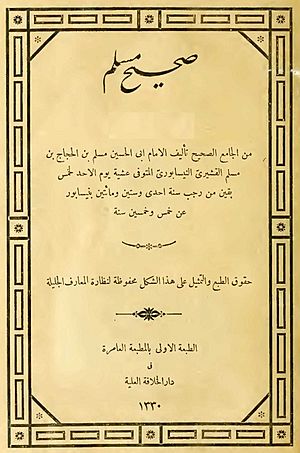Sahih Muslim facts for kids
 |
|
| Author | Muslim ibn al-Ḥajjāj (822–875) |
|---|---|
| Language | Arabic |
| Series | Kutub al-Sittah |
| Subject | Hadith |
| Genre | Sunnah |
| Published | 9th century |
Sahih Muslim (which means "Authentic Muslim" in Arabic) is a very important book for Sunni Islam followers. It was put together in the 9th century by a Persian scholar named Muslim ibn al-Ḥajjāj. This book is a collection of hadith. Hadith are reports about the sayings, actions, or approvals of the Islamic prophet Muhammad.
After the Quran, Sahih Muslim is one of the most respected books in Sunni Islam. It is often mentioned alongside Sahih al-Bukhari as one of the two most reliable hadith collections. Sahih Muslim is also part of the Kutub al-Sittah, which are the six main collections of hadith in Sunni Islam. The book contains thousands of hadith stories, spread across its introduction and 56 different sections.
Muslim ibn al-Hajjaj wrote an introduction to his book. In this part, he explained why he chose certain hadith to include in his collection. He wanted to make sure only the most accurate and trustworthy stories were in his book.
How Sahih Muslim Was Created
Muslim ibn al-Hajjaj started writing Sahih Muslim for a scholar named Ahmad ibn Salamah an-Naysaburi. He also felt it was important to write this book because he noticed that some hadith scholars of his time were not careful. They sometimes shared daʻīf (weak or unreliable) stories.
Muslim collected about 12,000 hadith stories. From these, he carefully picked about 4,000 to put into his book. He had a very strict way of checking if a story was true.
Checking the Stories
Muslim divided the people who told hadith stories into three groups based on how good their memory was and how honest they were:
- The first group included people with excellent memory. They were honest and could be fully trusted.
- The second group had people whose memory was a little weaker. But they were still trustworthy, knowledgeable, and honest.
- The third group included people whose honesty was questioned or debated.
Muslim only included hadith that came from the first two groups. He did not use any stories from the third group. Also, for a hadith to be included, it had to have a continuous isnad. An isnad is like a chain of people who passed the story down. Each person in the chain had to be reliable. The story also had to be passed down through two trustworthy tabi'un (followers of the Prophet's companions). Each of these had to have heard the story from two companions of Prophet Muhammad.
Books Based on Sahih Muslim
Many scholars have written books to explain and comment on Sahih Muslim. More than 60 such books have been created. Some famous ones include Al Minhāj Sharḥ Sahīḥ Muslim by Al-Nawawi and Fath al-Mulhim bi-Sharh Sahih al-Imam Muslim by Shabbir Ahmad Usmani. These books help people understand the deeper meanings of the hadith in Sahih Muslim. Translations of these commentaries are available in many different languages.
See also
 In Spanish: Sahih Muslim para niños
In Spanish: Sahih Muslim para niños
- Muslim ibn al-Hajjaj, the scholar who wrote Sahih Muslim
- Sahih al-Bukhari, another very important hadith collection, often paired with Sahih Muslim
- Muhammad al-Bukhari, a hadith scholar and one of Muslim's teachers. He wrote Sahih al-Bukhari.
- Kutub al-Sittah, the six most respected hadith collections in Sunni Islam. These include Sahih al-Bukhari and Sahih Muslim, along with:
- Sahih at-Tirmidhi, by Al-Tirmidhi
- Sunan ibn Majah, by Ibn Majah
- Sunan Abu Dawood, by Abu Dawud al-Sijistani
- Al-Sunan al-Sughra, also called Sunan an-Nasa'i, by Al-Nasa'i
 | Jackie Robinson |
 | Jack Johnson |
 | Althea Gibson |
 | Arthur Ashe |
 | Muhammad Ali |

